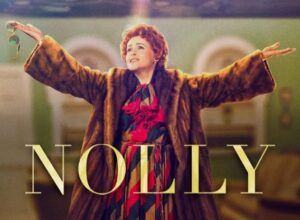I’m always happy to report on excellent entertainment and Nolly brings it home with flying colors. Nolly tells the story of Noele Gordon who began a long career with an early color television transmissions test in 1938.
Nolly, played by Helena Bonham Carter, focuses on twilight of Gordon’s career during and after her firing from Crossroads, a long running British daily soap opera.
Nolly isn’t an Exciting Story
The first thing that really struck me about Nolly is that it’s just not a thrilling story. There are few big moments. It’s just the story of a woman in show business who gets fired from her job and must recover.
Even the firing itself isn’t particularly dramatic. There is no storming and screaming. Nolly’s agent goes in to negotiate the new seasonal contract and is simply told she’s being cut from the show. The agent then tells Nolly who is in denial for a little while but eventually accepts the situation with some aplomb.
Story First
The story is the thing with Nolly. Nolly is clearly an overbearing presence on the set of the show and the other actors fear her but also love her. This is shown to us by her actions, not told to us through exposition. We first meet her when a new actor to Crossroads almost sits in Nolly’s seat at the head of the room preparing to read through the daily script. The other actors, in a panic, manage to stop the newcomer.
During the reading, Nolly is demanding about where she will stand, the dialog she will speak, and even goes as far as changing the accent to be used by the newcomer. Soon after this insight into her demanding nature we see her knowing the names of almost everyone on the set, asking about their family, making sure things are done for everyone.
Nolly is a complicated character, tough but caring, and Carter portrays the two sides with absolute believability. I’m immersed in the show.
The story doesn’t try to force us to be sad or to laugh or to do much of anything. The story unfolds and sometimes we laugh, sometimes we’re sad, sometimes we’re angry. It’s rare these days that a television show trusts the audience like this. Mostly we see scenes that are purpose designed, and telling the story isn’t that purpose. Let’s make them laugh. Let’s make them sad. Let’s put in a scene that will accomplish what we need whether or not it fits the story. Nolly has none of that.
Why was Nolly Fired?
A big part of the second half of the three-episode series is trying to figure out why Nolly got the axe. Nolly only finds out herself very near the end and it subverts her expectations and thus ours. I won’t get into details but it is totally believable. There are no real bad guys, just people doing the best they can.
The Ending
The ending of Nolly isn’t a big, ground-breaking, show-stopping scene. It ends like it runs, gently but believably. It seems almost like an anti-climax to us because we’re used to big endings and I think some people will be disappointed. I thought it totally appropriate.
Conclusion
Nolly isn’t the sort of show that most of the producers of modern entertainment think we want to see, at least judging by what’s on television and in the movie theater these days. That’s a shame because a simple story done properly is quite effective, at least in my opinion.
Nolly, give it a shot but don’t expect to be blown out of your chair. Expect to laugh a bit, to be sad a bit, to forget that fifty minutes has passed and the episode is over before you know it. It’s quality entertainment.
Tom Liberman
